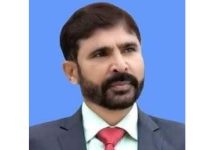Dr. Muhammad AkramZaheer
Last week in Pakistan, something surprising happened in the big national election. Imran Khan’s party, Pakistan Tehreek-e-Insaf (PTI), won more votes than anyone expected. This unexpected win has made many people worried about what might happen next in the country. People are concerned that this could lead to more confusion and problems in the government. Imran Khan has been a well-known figure in Pakistani politics for a long time. He leads PTI and has promised to bring in a new and better way of running the country, with transparency, accountability, and economic growth. However, the election results have made people doubtful and anxious. Many are questioning whether the election process itself can be trusted. The national election had been delayed for a long time, creating uncertainty and suspicion among the people. Delays in elections often make people not trust the process, and the long wait had made many wonder why it was postponed in the first place. The sudden turn of events in favor of PTI has only added to these doubts, creating an atmosphere of political uncertainty that might harm the stability of the nation. One major worry about PTI’s unexpected win is that it might lead to more political problems. A sudden change in who holds power can make the country’s political institutions shaky, which could affect how the government works and puts policies into action. Without a clear decision from the voters, existing challenges could become even more difficult to handle, leaving the country in a state of political uncertainty.The surprising outcome has also raised questions about the health of Pakistan’s democracy. Democracy relies on openness, fair play, and accepting the results of elections. PTI’s unexpected victory has led to claims of irregularities and manipulation from other parties, making people doubt if the results are legitimate. Such accusations can make people lose trust in the democratic process, making them doubt the power of their vote to bring about real change.
Before the election, people thought that no party would get the most seats in the National Assembly. Many expected Nawaz Sharif’s party, Pakistan Muslim League-Nawaz (PML-N), to get the most seats and easily make a government with the help of other parties. On the other hand, Imran Khan’s PTI faced challenges from the military, which affected its chances. Surprisingly, independent candidates linked to PTI won the most seats, giving them the chance to create a new government. This unexpected result has created uncertainty and might cause more political issues in Pakistan. The voter turnout was about 47%, which is higher than usual for Pakistan but lower than the previous election in 2018. The National Assembly has 336 seats, and the election was for 266 seats. PTI got the most seats with 92, followed by PML-N with 77, Pakistan People’s Party (PPP) with 54, and MuttahidaQomi Movement Pakistan (MQM-P) with 17. PTI, officially banned, is expected to join forces with an approved party to combine their votes. The election results have divided political forces into two camps. PTI, claiming election manipulation, plans to appeal to the courts and protest peacefully. PML-N, the other camp, is negotiating with other parties to create a coalition government. PML-N seems to have a clearer path to getting the majority needed to govern.
The military seems to be the biggest loser in the election. The results show that the public is angry at the military’s involvement in the election process. The military, which hasn’t faced such criticism since 1970, is now on the defensive. Despite strong arguments between PTI’s leader and the military, some repairing of relations might be needed for PTI’s leader to regain freedom and office. However, it is likely that Pakistan will end up with a weak and unstable coalition government. This government may struggle to address the significant economic, social, and environmental issues facing the country. Both PTI and PML-N, whether in government or opposition, may spend much of their time questioning the legitimacy of the government and demanding new elections, making the 2024 national election another challenge for Pakistan’s democracy.

















